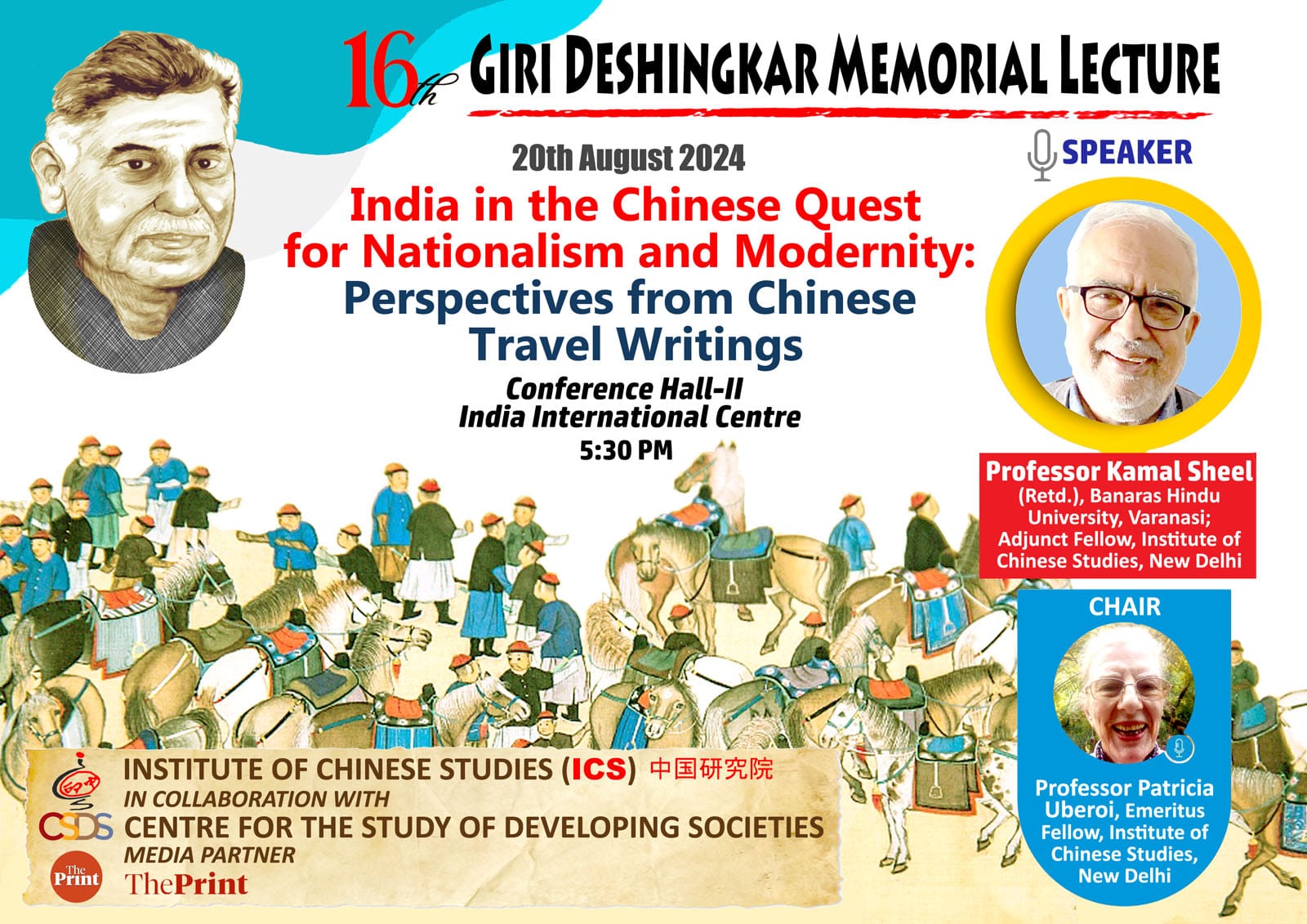Events > Giri Deshingkar Memorial Lecture

Abstract
India has been at the forefront of Chinese intellectual world-view since ancient times. While China and India shared a civilizational bonhomie, the shift of China from a civilization-state to a nation-state during the eventful late nineteenth and early twentieth century is marked by the beginning of national anxieties in modern Chinese discourse on India. Dilemmas and predicaments that shrouded the concept of civilization and its linkages with the modern concept of nationalism and modernity, brought India more in the picture. This can be seen in travel narratives by modern Chinese intellectual-visitors to India. In this context, an attempt has been made to present how India figured in the first two substantive modern travelogues by Huang Maocai and Kang Youwei. These texts provide a valuable prism in gauging the mind of the early twentieth century intellectual and Chinese modernisers, as they grappled with the challenges and uncertainties of those times with India as a reference point.
Huang Maocai, a trained Chinese cartographer in the service of the Imperial Qing state, was deputed to ascertain the Tibet-India land route and the geo-political status of British India. The impetus was the Sino-British Treaty of Yantai in 1876 that extended British trade and travel rights to interior China. This led to some real apprehensions in China about the security and sovereignty of their territory, with increased movement of foreigners in their south-west frontier region at the peak of “Great Game” between Britain and Russia. Huang’s task was to map the wild south-western frontier of the empire and safeguard their “imagined” national territory. During close to two years of his travel [1878-1880], he passed through Sichuan, Tibet, Yunnan and Myanmar, and reached India through an overland route and returned to Guangzhou, China, from Kolkata by the maritime route. “Civilization” and “nation” both figured in his exploration of the situation in India. His various observations and descriptions of the travelled region are inscribed in two short volumes entitled, Xiyou Riji [Diary of the Travel to the West] and Yindu Zazhi [Miscellaneous Notes on India], published in 1886.
A maverick intellectual and modernizer of late 19th century China, Kang Youwei was the leader of the famous Hundred Day Reform Movement of 1898. His 1901-1902 travelogue, Yindu Youji [Record of Travel to India], contains observations on history, politics, society, religion, and art and architecture. He found more differences between China and Europe than similarities between China and India. Changing political maps of the nation-states in Europe in the nineteenth century was discomforting to his idea of unity, peace and harmony. To be sure, Kang's ire was against the west-inspired modernity and nationalism that sought to annihilate civilizational forces and enslave a country. Colonial India disturbed him. How could an India whose civilization enchanted not only China but also other global civilizations, without much resistance, succumb to the colonial state and its culture? China, he mused, must draw lessons from Indian experience and redefine the idea of nationalism and modernity.
About the Speaker
Kamal Sheel was Professor of Chinese language at the Banaras Hindu University, Varanasi, India, until his retirement in 2016. He is now an Adjunct Fellow of the Institute of Chinese Studies, New Delhi. Prof. Sheel completed his BA from Banaras Hindu University and a postgraduate training in Chinese language and history at Fu-Jen Catholic University and the National Taiwan University, Taipei, Taiwan. He received a doctoral degree in the field of Modern Chinese History at the University of Wisconsin - Madison, USA. He has been Visiting Professor/ Fellow at the universities in Wisconsin- Madison, Yale, Copenhagen, Beijing, Singapore, and Taiwan; and in India in University of Delhi, Panjab University, Central University of Sikkim, and IIT- BHU. His current research interest primarily lies in the area of social and intellectual history of China, and cultural interaction and encounters in Asia with a focus on India and China. His major publication is Peasant Society and Marxist Intellectuals in China (Princeton 1989). He also has to his credit jointly edited volumes titled India on the Silk Route (Delhi, 2009) with Charles Willemen and Lalji; From Local to Global: Papers in Asian History & Culture (Delhi, 2017) with Kenneth Zysk and Charles Willemen; Thirteen Months in China: A Subaltern Indian and the Colonial World (Oxford, 2017) with Anand Yang and Ranjana Sheel. His two other works with Prof. Ranjana Sheel have been published with titles, Kang Youwei Engages India: His Travel Narratives (1901-1902) and Predicaments of Civilization and Nation; and Territorializing the Chinese Nation: Cartography, Geopolitics and Huang Maocai’s Mission to India (1878-1880) by Routledge in 2024.
 Report
Report
ICS-HYI MULTI-YEAR DOCTORAL FELLOWSHIP IN CHINA STUDIES: 2026
© 2019 ICS All rights reserved.
Powered by Matrix Nodes